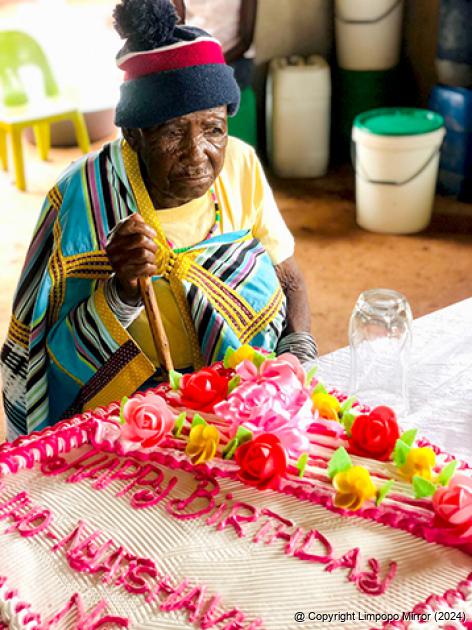

ADVERTISEMENT:

GogoVho-Nyatshavhungwa of Duvhuledza village outsideThohoyandou celebrated her 100th birthday on 1 January.
Gogo Mudzanani-Nangammbi celebrates 100th birthday
Gogo Vho-Nyatshavhungwa Mudzanani-Nangammbi from Duvhuledza village near Mubumoni outside Thohoyandou was joined by her children, relatives, and local residents to celebrate her 100th birthday on 1 January.
The function was held in Duvhuledza–Nangammbini and great care was taken by all guests to adhere to the Covid-19 protocols, while they shared this special day with her.
Gogo Mudzanani-Nangammbi was born and bred in the rural village of Shakadza in the Mutale area, but was married in Duvhuledza. She said that, although she now walked with the aid of her walking stick, she was still strong and hoped to celebrate many more birthdays to come.
She thanked everyone, including her children, who had helped to organise a party for her. “I can still speak well, eat and am able to see. I enjoy eating mashonzha (mopani worms), vegetables (miroho) and fruits. I thank God that I’m still alive at this ripe age, because many of the people of my age are no longer alive. I’m celebrating this day because of the will of God. Someone who celebrates 100 years nowadays is considered being a lucky person, especially as the country is attacked by the coronavirus and HIV/Aids,” Mudzanani-Nangammbi said.
In taking care of herself, Gogo Mudzanani-Nangammbi said she did not eat food cooked in fat or drink alcohol. She remembered the old days in her rural village of Shakadza, when they had to walk from one village to another as no public transport was available like today. They also had to go to the fields to plough. In those days, they still had to use the old methods of grinding mealies, but she said that life was good back then.
According to her youngest son, Mpfunzeni Nangammbi, they were raised under difficult conditions but were taught good morals and always encouraged to take education seriously. Mpfunzeni, who is now the principal of Khubvi Primary School, said that, although he had been born into a poor family, his mother had been very strict as far as schoolwork was concerned and had always made sure that the paraffin lamp was filled.
“She used to brew traditional beer called mahafhe, and with the little money she made, paid our school fees. When I started sub-A, neither my father nor my mother worked, and we were dependant on subsistence farming. When I went to college, the main source of funds were old-age grants. I was lucky that my college fees could be paid, although it was very cheap in those days. All that was required at college was hard work and determination in schoolwork. We are very thankful for my mother’s devotion and love,” Mpfunzeni said.
Date:09 January 2021
By: Silas Nduvheni
Read: 869

ADVERTISEMENT

ADVERTISEMENT:

ADVERTISEMENT:

Recent Articles
-

'Pervert case' back in court
25 April 2024 By Victor Mukwevho -

Drivers of delivery trucks fear more hijackings
25 April 2024 By Elmon Tshikhudo -

'Rambo' Tshivhase hailed as a brave, intelligent leader
25 April 2024 By Victor Mukwevho -

Legendary Solomon Mathase makes music with Dzomo la Venda
25 April 2024 By Elmon Tshikhudo -

Musasenda Big Five win Vision Tournament
25 April 2024 By Frank Mavhungu

ADVERTISEMENT

Popular Articles
-

Leopards’ top striker dreams of playing for Kaizer Chiefs
22 March 2024 By Frank Mavhungu -

Well-known inventor, Prof Mulalo Doyoyo, dies
14 March 2024 By Victor Mukwevho -

Lesley Manyathela stadium remains a 'white elephant' to local clubs
23 March 2024 By Kaizer Nengovhela -

Prophet Muritho's nightmare continues
19 April 2024 By Elmon Tshikhudo -

Park development leaves residents puzzled
22 March 2024 By Andries van Zyl -

Many questions as man shoot himself in the head
15 March 2024 By Elmon Tshikhudo -

Choir leader shot twice during Easter service
05 April 2024 By Victor Mukwevho

